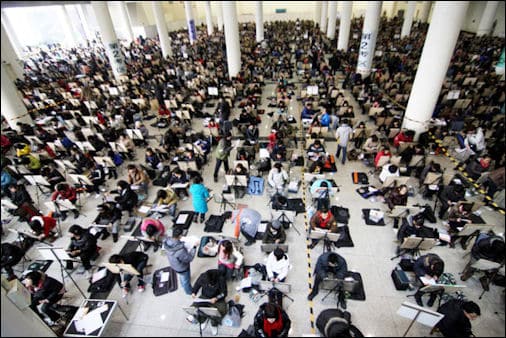June is the most anticipated time of the year in China–and yes, I am talking about the Gaokao (the College Entrance Exam). For those of you who are not particularly familiar with the Chinese educational system, the Gaokao is the nationwide exam held once a year that determines college admissions. Although nowadays alternative paths to tertiary education exist (for example, studying abroad), taking the Gaokao remains the only pathway for the majority of graduating Chinese high school seniors.
In China, where there is a particularly high value placed on education, getting admitted into colleges (and preferably the good ones) is usually viewed as the first and foremost step towards personal success. It is often said that Chinese students have been preparing their whole lives for this very exam–and in many cases, this can indeed be understood in the most literal sense.
A Gaokao-related tragedy has aroused heated public discussions these days. In Hunan province, a mother who had come to see her daughter off was hit by a truck while on the way to the exam center. According to the news report, after being persuaded by the police and bystanders, the accident-shaken girl decided to go along with the exams, while the police accompanied her mother to the hospital. This very choice of hers (taking the exams instead of going to the hospital with her mother) incited debates. Yiyun Zhang, a popular pop-psychologist/therapist, claimed on her Weibo (the Chinese equivalent of Twitter) that she would have made a different choice under similar circumstances. “It doesn’t matter if you could score high when you don’t know how to properly prioritize what is truly important in life,” Ms. Zhang said.
I do not agree with her or others who have judged for themselves that the girl in the news has made a “mistake.”
It is not that I do not think family is important (more important than personal success at times)–not at all. What I find quite disagreeable (if not outright judgmental and cruel) is that we have turned a personal tragedy into a showcase and contest of gaining the “moral high ground.” It is easy to pass on judgments when riding on that shining high horse, yet sitting there, we almost always forget that what we are talking about, discussing and debating over, are the life-changing events of other people–human beings who deserve empathy and compassion, not lectures or judgments.
I have originally begun my blog wanting to talk about family relationship and personal success, about which one is more important and how we should make choices under extreme circumstances. Yet while actually writing down the words, it has dawned on me that society has focused too much on the “should-be”s and “should-do”s: how you “should” lead your life in order to be “successful” (by society’s standard, that is); how you “should” prioritize; what you “should” do when it comes to family. With such prevalent discourse and mentality, we rarely stop and think about the other side of the story–that this is not a one-size-fits-all world. There is not always a universally right thing to do.
Walking a mile in others’ shoes is intended for empathy, not for passing judgment about how the owner should walk when you return his or her shoes.
Last but not least, my sincere and best wishes to the girl and her family.
中国文化自古十分重视“教育”,在这样的语境下,升入大学——尤其是名校——往往被视为通向成功的第一步、也是最重要的一步。因而,若说许多中国学生十几年寒窗苦读,为的就是一场高考,并不十分夸张。
最近,一件与高考相关的悲剧引发了强烈的公众讨论。在湖南长沙,一位送女儿去考场的母亲在送考途中,被卡车撞飞。据媒体报道,在交警和路人的劝说 下,女儿含泪赴考,由交警将其母亲送往医院。而她的这一抉择(去参加高考而不是陪同前往医院),激起了热烈的辩论。张怡筠,一位活跃于媒体的心理学家与咨 询师,在自己的新浪微博上称,在相同情况下,一定会做出不同选择:“生命中的优先顺序,如果无法正确应答,就算大考的高分也无益。”
坦白说,这样的论点与价值判断,让人无法苟同。
我无意否定家庭的重要(家庭之重,在某些情境下,远胜个人成功);让我觉得不妥甚至冷酷的在于,一场个人的悲剧,被演化成对“道德制高点”的追逐和 表演。用一个居高临下的姿态,我们往往可以轻松地对别人的行为处事发表价值判断,然而,也恰恰是在这样的姿态下,我们轻而易举地忽视了,我们所施展的文字 机锋与智力游戏,正是该别了他人生活的真实事件。而这样的“他人”,需要的是共情与理解,而非居高临下的评判与好为人师的教训。
在本文开始,我原想写一写家庭与个人成功的关系,写一写其间孰轻孰重,而我们又该如何抉择。然而在真正行文的过程中,我意识到,我们——这个社会 ——将过多的注意力集中在了那些“应该如何”上:我们应该如何获得社会认可的“成功”;我们应该如何抉择轻重;我们应该如何对待家庭。然而,在这样“应 该”的话语与心态里,我们往往忘记了故事的另一面:这并不是一个有固定标准的大同世界,在很多时候,并没有放之四海皆准的“应该”。
有一句英文习语,叫“穿着别人的鞋走路”,然而这样,是为了要设身处地理解他人,而非在还鞋子的时候,对主人的步法评头论足。
最后,衷心地祝福长沙女孩与她的家人。


